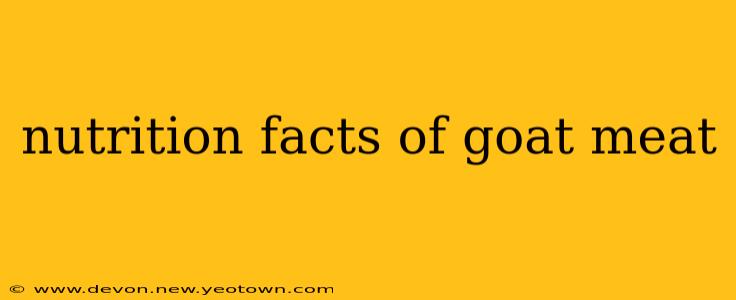Goat meat, often called chevon, is a lean, flavorful protein source gaining popularity worldwide. But beyond its delicious taste, lies a nutritional profile packed with benefits. Let's explore the nutritional facts of goat meat, unraveling its health advantages and addressing common questions.
What are the nutritional benefits of goat meat?
Goat meat is a nutritional powerhouse, boasting a lean protein profile and essential vitamins and minerals. Compared to other red meats, it's lower in fat and cholesterol, making it a heart-healthier option. A typical 3-ounce serving provides a significant amount of protein, crucial for building and repairing tissues. This protein is also rich in essential amino acids, the building blocks your body needs but can't produce on its own. Beyond protein, goat meat offers a good source of iron, zinc, and B vitamins, all vital for energy production, immune function, and overall well-being. Think of it as nature's multivitamin packed into a delicious meal!
How does goat meat compare to other meats nutritionally?
This is where goat meat truly shines. Compared to beef, for example, goat meat generally contains less total fat and saturated fat. This translates to a lower risk of heart disease and other health problems associated with high saturated fat intake. While both provide excellent protein, goat meat often boasts a higher concentration of iron, making it particularly beneficial for individuals prone to iron deficiency. Chicken and turkey, while lean, typically have lower iron and zinc content than goat meat, making chevon a valuable alternative for those seeking a broader nutrient profile.
Is goat meat high in cholesterol?
While goat meat contains cholesterol, it's significantly lower than that found in beef or lamb. The lower cholesterol content, combined with its leaner profile, contributes to its reputation as a heart-healthier red meat option. However, individual dietary needs vary, and consulting with a healthcare professional or registered dietitian is always recommended, especially for those with pre-existing health conditions.
What are the potential health benefits of eating goat meat?
The health benefits of goat meat stem directly from its nutritional profile. The high protein content supports muscle growth and repair, making it ideal for athletes and those seeking to maintain muscle mass. The iron content combats iron deficiency anemia, a common condition causing fatigue and weakness. The zinc contribution boosts the immune system, enhancing its ability to fight off infections. The B vitamins are crucial for energy metabolism, ensuring your body efficiently converts food into usable energy. In essence, regular consumption of goat meat can contribute to improved energy levels, stronger immunity, and better overall health.
Is goat meat good for weight loss?
Goat meat can be part of a healthy weight loss plan. Its lean protein content keeps you feeling full and satisfied, reducing cravings and potentially aiding in calorie control. High-protein diets have been shown to increase metabolism and boost fat burning. However, portion control remains crucial for effective weight management, and goat meat should be integrated into a balanced diet with plenty of fruits, vegetables, and whole grains for optimal results.
What are some healthy ways to cook goat meat?
The best way to enjoy the nutritional benefits of goat meat is to prepare it healthily. Grilling, baking, or slow cooking are excellent methods that minimize added fats and preserve its natural flavors. Marinating goat meat in herbs and spices not only enhances its taste but also adds antioxidants and other beneficial compounds. Avoid frying or using excessive amounts of oil, as this will increase the overall fat content of the dish.
By understanding the nutritional facts of goat meat, you can make informed choices and incorporate this delicious and nutritious protein into a well-rounded, healthy diet. Remember to always consult with a healthcare professional or registered dietitian for personalized dietary advice.

